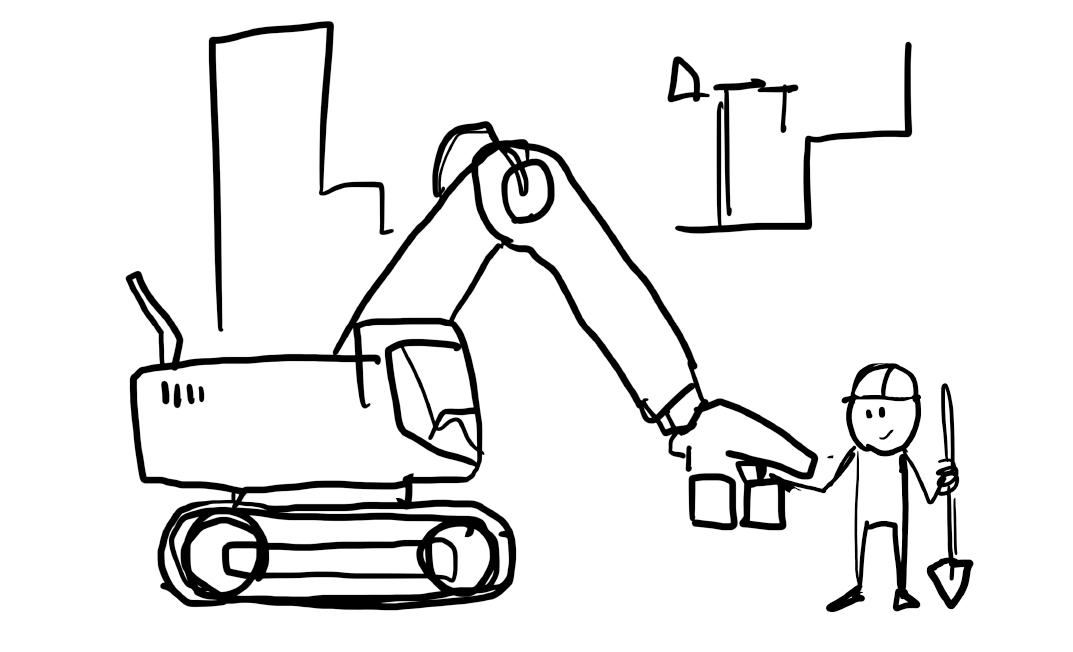WHEN THE EXCAVATOR LENDS ITSELF
A mid-sized company rents out construction machinery and conveyor systems. The company is regionally positioned and plans to digitize the entire handling of the equipment rental. By using the blockchain technology, the rental process is to be automated and tamper-proof. At the same time, the foundation stone is to be laid for further digital services in order to be able to serve customers more individually and, above all, more quickly in the future.

CHALLENGE: MANUAL COST DRIVERS & LOCAL LIMITATION
The rental of construction machinery consists of a vast number of individual process steps, most of which are still carried out manually or with paper support today and thus represent significant cost drivers. This includes, for example:
- The customer’s request and the comparison with the available devices.
- The inspection of the machine by a service technician and documentation of its condition.
- Hiring a logistics company to transport the rented machine to the customer.
- Issuing insurance benefits etc.
In addition, letting services are always regional, while construction companies usually operate on a supra-regional basis. If a customer wants a service in another region, he must look for a new partner ecosystem for each construction site. However, centrally managed rental platforms are at the expense of local landlords, as valuable customer relationships are lost here.
GOAL: AUTOMATION & COOPERATION
Against this background, the use of blockchain technology offers concrete starting points for increasing efficiency in the rental process. This includes:
AUTOMATION OF ORDERS FROM CUSTOMER ENQUIRY TO INVOICING OF SERVICES
If a machine is logged off at the construction site, the logistics partner can be automatically commissioned digitally and simultaneously receives the required location data. In addition, the transfer of risk from the customer to the rental partner takes place upon deregistration of the device. Payment can also be triggered automatically. Manual typing of delivery notes and transport orders is also no longer necessary.
TAMPER-PROOF AND TRUSTWORTHY DATA STORAGE
For handling the transfer of risk, i.e. the time at which the economic ownership and thus responsibility for possible damages passes to the contractual partner, all relevant information such as the condition data of the machines and the time of handover is stored transparently and forgery-proof in the blockchain.
PLATFORM-BASED COOPERATION MODELS FOR THE MUTUAL PLACEMENT OF ORDERS
If a customer cannot be served by his service provider due to capacity bottlenecks, he has the possibility of requesting free capacities from other rental companies via a platform. Their capacity data is stored decentralized in the blockchain and automatically compared with the requests. Since no central authority exists to manage data and customer relationships, regional providers can interconnect at eye level and flexibly place orders with each other.
SOLUTION: SELF-CONTROL THROUGH SMART CONTRACTS
To implement these process optimizations, Smart Contracts can be used in which all contract conditions relevant for automated rental processing, such as the equipment to be rented, the rental period and the agreed use, are stored. This enables various usage scenarios:
- The logistics partner can confirm receipt of the machine with a smartphone app. The registration and deregistration of the devices on the construction site is also carried out in this way.
- From the planning system, a specific machine can be selected for rental and ordered digitally. The machine or its digital twin in the blockchain controls all further process steps independently.
- Other ecosystem partners, such as landlords in other regions, can also be invited to the smart contract. This serves as a link between all participants and contains the relevant data in an unchangeable form and independently triggers processes, such as payment or delivery of status information to dispatchers.
RESULT: BASIS FOR NEW BUSINESS MODELS
The prerequisite for using a Smart Contract in the sense of a digital twin is the automatic provision of all information necessary for processing the rental process. For this reason, all existing process steps in the present project first had to be mapped completely digitally. The transparency and automation created by this alone, for example in order processing, already ensured a significant increase in efficiency and made it possible to process letting to the customer in a more professional manner. At the same time, by integrating the processes into the decentralized corporate network “evan.network”, an open ecosystem was provided, which serves as a basis for the integration of further letting partners and the realization of new or expanded business models. The following further business model innovations can already be implemented today with the existing blockchain infrastructure:
- Generation of new sources of revenue away from the sale and rental of equipment, in the form of supplementary services, such as qualified machine operators, insurance and much more. The more partners need to be coordinated in the context of such additional service offers, the better the use of the blockchain.
- A direct connection of the machine to the blockchain within the scope of Smart Contracts for the control of access and type of use as well as their billing directly by the machine itself or its digital twin.
- Digital access to videos and instructions for operating and securing the machine via the digital twin of the construction machine during the rented period.
